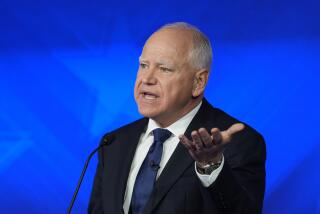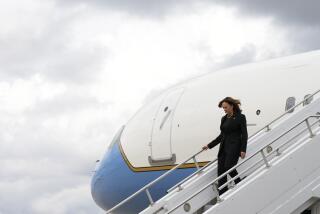Envoy Inquiry Botched, Panel Says
- Share via
WASHINGTON — The State Department blundered at every stage of its investigation of a former diplomat suspected of accepting bribes and other favors in exchange for visas he issued from the U.S. Embassy in Beijing, congressional investigators said Wednesday.
A staff report by the House Government Reform Committee accuses the embassy in Beijing, two State Department offices in Washington and the FBI of destroying documents, failing to interview witnesses and generally mishandling the investigation of Charles Matthew Parish, whose alleged activities were reported by The Times in May.
The congressional report argues that the State and Justice departments were reluctant to conduct a thorough investigation of Parish, deciding instead to transfer him to a sensitive job in Washington and eventually allowing him to retire on full pension.
Parish was accused of using his position to grant visas for friends, of accepting gifts and of improper fraternization with Chinese women. Many of the disputed visas went to employees of several Chinese government businesses, including ones associated with Johnny Chien Chuen Chung, the former Democratic Party fund-raiser accused of funneling Chinese government money into President Clinton’s reelection campaign.
The House committee headed by Rep. Dan Burton (R-Ind.) became interested in Parish because of his ties to Chung.
The account parallels The Times’ investigation of visa fraud, which detailed the Parish case and charges against other diplomats. About 800 diplomats in 230 consulates have the power to issue visas allowing foreigners to enter the United States.
In a March interview, Parish acknowledged accepting free lodging worth hundreds of dollars from the Phoenix representative of a Chinese state-owned trading conglomerate, after he reversed a subordinate’s decision and approved a visa request submitted by a representative of the company.
But he denied an allegation that he had accepted cash from an official of a different company in exchange for approving a visa.
Allegations of improper activity by Parish first surfaced in 1995, but it was not until April 1996 that the embassy began an official inquiry. Later, the two State Department agencies, the Bureau of Diplomatic Security and the Office of the Inspector General, took up the case. The Justice Department also has begun its own probe.
“Parish’s superiors at the embassy were aware that Parish was a problem, and failed to take real action to stop [him],” the report says.
Although the embassy’s security chief sealed Parish’s office and seized a sheaf of documents, the investigator eventually gave in to requests to permit other officials to occupy the office. Most of the documents were eventually destroyed, the report says.
In Washington, the report says, the diplomatic security bureau ignored some seemingly promising leads, restricting its investigation to visas that Parish issued to employees of a small group of Chinese companies. The investigators did not look into visas issued to employees of several other enterprises, it says.
“To the extent that Diplomatic Security did conduct an investigation, it appears to have been too quick to clear Parish,” the report says. It says the investigation focused on showing that the companies were legitimate ones and that their employees seldom overstayed their visas.
The report says those issues were separate from the question of whether visas were obtained fraudulently.
It says the State Department’s inspector general also ignored reports that Parish had accepted gifts.
More to Read
Sign up for Essential California
The most important California stories and recommendations in your inbox every morning.
You may occasionally receive promotional content from the Los Angeles Times.













